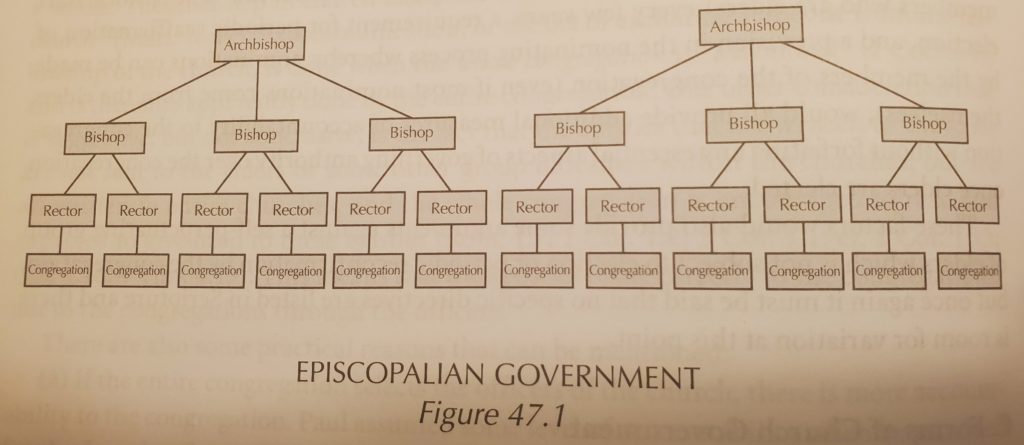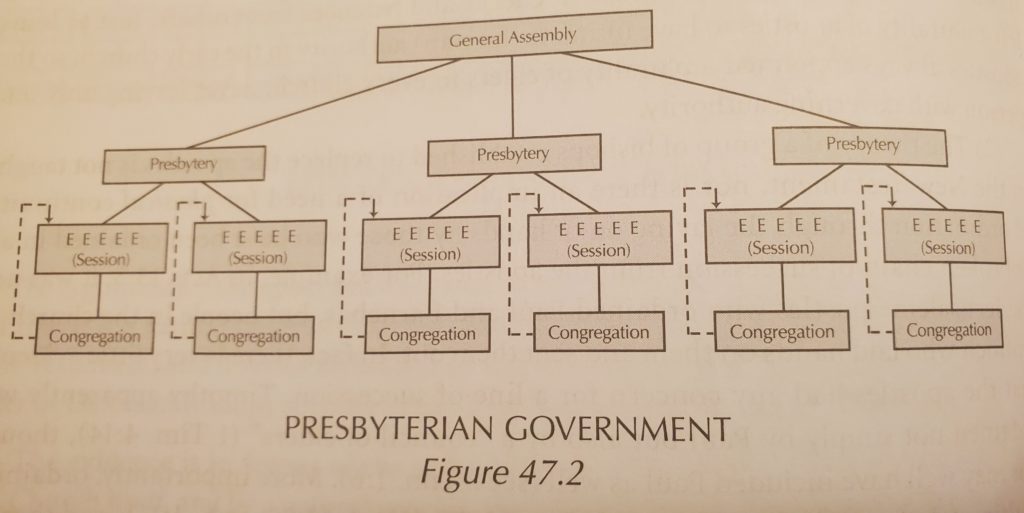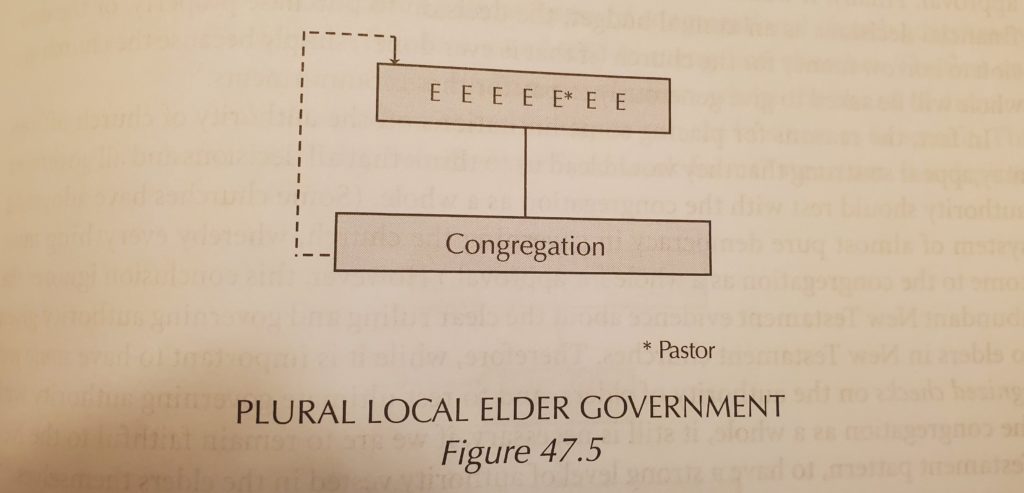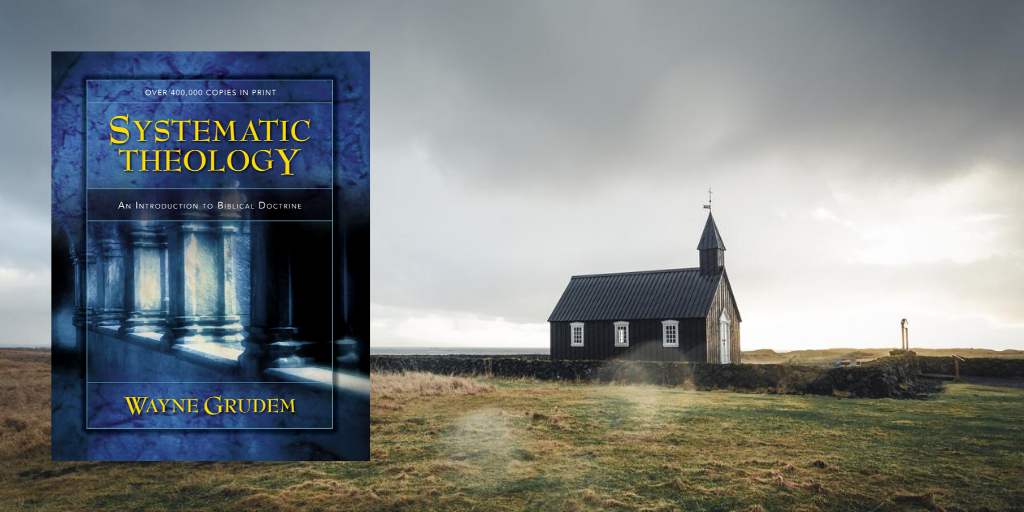Reading Systematic Theology with Wayne Grudem – How should a church be governed? How should church officers by chosen? Should women serve as pastors of churches?
This post is part of a 50+ post series from the classic work by Wayne Grudem (PhD, Cambridge), Systematic Theology: An Introduction to Biblical Doctrine. The aim of each post is to provide an overview of each chapter in the book and related resources for each topic.
Synopsis of Chapter
In this extended chapter on church government, Wayne Grudem reviews the major elements of how a church is governed. Grudem covers the concept of church officers, who the biblical church officers are, and how they should be chosen. Grudem then reviews the various forms of church government throughout church history. In the final section, he includes an in-depth, biblical and historical case for why women should not be considered for church officer positions.
Church Officers
A church officer is “someone who has been publicly recognized as having the right and responsibility to perform certain functions for the benefit of the whole church.” Traditionally, these officers are installed or “ordained” in a public manner. There are three church officers the New Testament identifies: apostles, elders, and deacons.
The term ‘apostle’ is used in a broad and narrow sense in the Bible. In a broad sense, apostle (Greek: ἀπόστολος) meant a messenger (Philippians 2:25; 2 Corinthians 8:23). In a more narrow sense, the apostle was a special office (Ephesians 2:20; 2 Timothy 1:1).
The office of the apostle had a unique kind of authority . To disbelieve or disobey an apostle was to disobey God (2 Thessalonians 3:14-15). To be qualified as an apostle, they had to see Jesus with their own eyes and get commissioned by God to be an apostle. All twelve of the original apostles were selected by Jesus in his earthly ministry. These two requirements were also met by Paul (1 Corinthians 9:1) and Matthais (Acts 1:24-26), two apostles selected after Jesus’ ascension. The office of apostle seems to have closed with the appointment of Paul as an apostle since he says “Last of all, as to one untimely born, he appeared also to me. For I am the least of the apostles, unworthy to be called an apostle, because I persecuted the church of God.” (1 Corinthians 15:8-9).
An ‘elder’ is a different kind of officer in the church which continues to this day. The elder (Greek: πρεσβύτερος) is a church leader who served on a counsel with other elders in a local congregation. In each town, plural elders served the church as leaders in those congregations (Acts 14:23; James 5:14). Elders are also called “pastors,”, “bishops,” and “overseers” depending on the context and translation of the Bible. Elders rule in congregations (1 Timothy 5:17), teach (1 Timothy 3:2), and defend the faith against those who contradict it (Titus 1:9). Elders are held to a higher standard than other believers. In both 1 Timothy and Titus, the Apostle Paul provided extended qualifications for elders. Here’s the 1 Timothy list of elder qualifications:
“The saying is trustworthy: If anyone aspires to the office of overseer, he desires a noble task. Therefore an overseer must be above reproach, the husband of one wife, sober-minded, self-controlled, respectable, hospitable, able to teach, not a drunkard, not violent but gentle, not quarrelsome, not a lover of money. He must manage his own household well, with all dignity keeping his children submissive, for if someone does not know how to manage his own household, how will he care for God’s church? He must not be a recent convert, or he may become puffed up with conceit and fall into the condemnation of the devil. Moreover, he must be well thought of by outsiders, so that he may not fall into disgrace, into a snare of the devil.” (1 Timothy 3:1-7)
A ‘deacon’ is another office in the church outlined in the New Testament. Deacon means servant (Greek: διάκονος). Deacons are mentioned in several places in the New Testament (Philippians 1:1) and are implied in other places (ex. Acts 6:1-6). Although deacons are not as prominent as elders in the church, they appear to serve a vital helping role. Like elders, deacons must be qualified to serve (1 Timothy 3:8-13).
Forms of Church Government
There are three larger categories of church government wherein church officers serve. These governments include episopalian, presbyterian and congregational. Each tradition of church government aims to find support for the government in the Scriptures, though it seems congregational government is the best supported.
The episcopalian form of government is one where an archbishop has authority over many bishops in a “diocese.” The bishop likewise has authority over rectors or pastors in individual congregations. The episcopalian government is not found in the Bible, but is argued for from early church history. In the Protestant tradition, the Episcopal Church practices this form of church government.

The presbyterian form of church government where each local church elects elders to a session. The session has governing authority over the local church. There is then another level of government in the presbytery, which has authority over the sessions. And finally, the “general assembly” has authority over all the presbyterys in the region or nation. This exact form of government is also not found in the Bible, but adherents point to Acts 15 when the Council of Jerusalem passed judgments that extended to the rest of the churches.

The congregational form of church government is more varied. There are five forms of congregational governments that have been practiced, but the commonality of each form is accountability lies with the congregation. These are the five forms of congregational government:
1. Single-Elder (Single-Pastor) Government: In this government, the congregation elects the pastor and the deacons. The pastor rules the congregation while the deacons act as advisors to the pastor.
2. The Pastor and Deacons May Govern Together and Thus Function like a Government of Plural Elders: In this government, the congregation elects the pastor and deacons, and the deacons and pastor function as co-leaders under the authority of the congregation.
3. Plural Local Elder Government: In this government, the pastor and elders are elected by the congregation. However, the pastor does not have direct authority over the people alone, but serves on an elder board that rules under the authority of the congregation.

4. Corporate Board Model of Church Government: In this government, a church board and the pastor is elected by the congregation. The pastor then serves under the authority of the church board.
5. Pure Democracy: In this extreme form of congregational government, every major decision is brought to a vote by the congregation. Pastors and deacons do not rule in these congregations.
Should Women Be Church Officers?
Throughout church history, most systematic theology textbooks have not attempted to answer the question of whether women should be church officers. The reason is that the overwhelming practice throughout church history is one of male leadership. In recent decades, theologians have challenged the tradition. For this reason, it’s good to review why tradition has dictated men assume roles of leadership in the church.
The main reason for male leadership in the church traces back to the New Testament. Paul is adamant that women should not have authority over men in a church. Assuming the Bible has authority over theological matters, it’s very difficult to deny the plain meaning of his words. The Apostle wrote to Timothy:
“Let a woman learn quietly with all submissiveness. I do not permit a woman to teach or to exercise authority over a man; rather, she is to remain quiet. For Adam was formed first, then Eve; and Adam was not deceived, but the woman was deceived and became a transgressor. Yet she will be saved through childbearing—if they continue in faith and love and holiness, with self-control.” (1 Timothy 2:11-14)
Application: Church Government Under Christ
Church government can be a complicated area of study. There are different church officers and multiple types of church governments. Sometimes it helps to focus on a single principle to ground complex issues.
The most important consideration regarding any church government is how Jesus is the ultimate ruler of the church. Christ must be the final authority in a church. Colossians 1:18 states, “And he is the head of the body, the church. He is the beginning, the firstborn from the dead, that in everything he might be preeminent.” So whatever form of government a true church adopts, Jesus, through his Word, should be the ultimate authority.
“So I exhort the elders among you, as a fellow elder and a witness of the sufferings of Christ, as well as a partaker in the glory that is going to be revealed: shepherd the flock of God that is among you, exercising oversight, not under compulsion, but willingly, as God would have you; not for shameful gain, but eagerly; not domineering over those in your charge, but being examples to the flock. And when the chief Shepherd appears, you will receive the unfading crown of glory.” (1 Peter 5:1-4)
Special Terms
- apostle
- bishop
- classis
- congregational government
- consistory
- deacon
- diocese
- elder
- episcopalian government
- general assembly
- hierarchical government
- local elders
- officer
- overseer
- pastor
- presbyterian government
- presbytery
- priest
- rector
- session
- synod
- vicar
Resources: Wayne Grudem
- Wayne Grudem: Book: Systematic Theology: An Introduction to Biblical Doctrine
- Wayne Grudem: 148 Lectures on Systematic Theology at Scottsdale Bible Church
Related Resources
- OpenBible.info: Verses on Pastors
- OpenBible.info: Verses on Church Government
- Erwin Lutzer: Different Forms of Church Government
- swrb.com: Government by Scriptural Church Officers
- Michael Horton: John Calvin on the Role of the Pastor
Image Credit: Church Surrounded by Grass by John Cafazza



